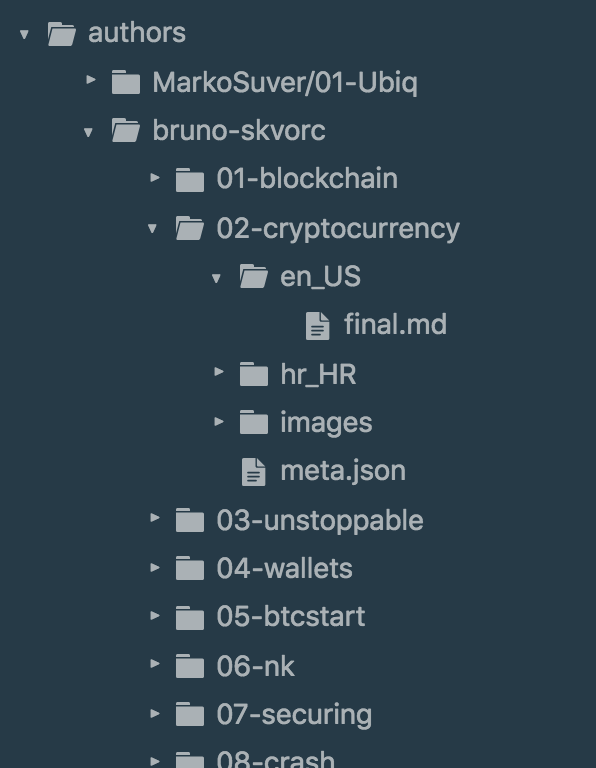Currently, to publish a post on the Status blog, one needs to be given permission to post to Ghost and then share a draft link with people who might be interested. This is a manual process which sometimes accidentally excludes people who might want to contribute in some way. There’s also the barrier of having to find the person to let you into our publishing process, which isn’t easy or practical for anyone. In order to increase transparency and a feeling of community on non-confidential publications, I propose an open source peer review model.
- We set up a repo:
status-im/writingor something of the sort. - Anyone interested in contributing a post forks the repo and submits a post in their own folder with a PR.
- The folders have a fixed structure, like this:
- This content is then up there, open source, with a label auto-applied “needs review”. Other labels exist such as “needs more content”, “needs language help”, etc.
- A review is anything from typos to content and ideas for changes
- Once a consensus has been reached on a post that it’s in publishable shape, it can be put online
Reviews work similarly: fork the repo and submit edits as PR to PR, or (arguably simpler) just put comments onto lines you think should be modified / removed / fixed.
Advantages
- a transparent review process, all out in the open
- the ability to reward the most active reviewers with SNT (e.g. top peer reviewer in October) or to find external contributors for hire (an outsider consistently active on our posts, submitting fixes or writing content might be a good candidate). Additionally, NFTs (badges) could be built to support this and add flair to our contributors - it’s vanity decoration, but one people tend to like a lot (I’m one such person, every aspect of my life is badgified really). I believe such a gamification of content review would be very appealing.
- a collaborative effort keeps everyone in the loop about pending and incoming topics, and lets the community and newsroom folk have a better overview of scheduling needs
- we can attach bounties on draft topics - “build an NFT with Embark”, “use Studio to debug a contract”, “optimize a dapp for performance tutorial”, all those are awesome tutorial ideas that we could throw out there and offer to people. Many aspiring writers simply have no idea what to write about and I end up manually suggesting topics when I manage such teams. A “for grabs” list such as this one would increase engagement, build the community, and reward contributors (say, $100 - $200 per post in SNT would be a good bounty for good tutorials, but payable only once peer reviewed for okayness).
- in time, this might turn the Status publication into a nice repository of quality blockchain-related technical content, helping the project with increased visibility, spreading education, and helping new aspiring writers with their careers.
Disadvantages
- it adds a layer of semi-bureucracy to the publishing process which will turn some people off
- it requires the use of Git which some people are not comfortable with
Note that a hybrid approach might be optimal here in which we test drive this for a while, see how it works out, but keep the old model for the “instantly allowed to publish stuff” people.
Examples:
I have implemented this process previously in two different publications with great success.
- SitePoint’s Peer Review - our engagement went up tenfold, and visits increased dramatically, though I have no figures to share, it’s been a while.
- Bitfalls Peer Review - does not work as well when the team is small and incentives are lacking, or when the project is a side-gig like this one. However, this one had a nice experimental twist - the metadata you see in the image above contains the ID of the post in the WP database. This made it possible to accept a PR to a post (e.g. a correction) in Github and have the post’s render in WP auto-update, so we didn’t even have to use WP after a while, and we could change to a different CMS easily. Github served as our own headless CMS there, in a way. Additionally, this model supports multi-language publishing because Bitfalls’ audience is primarily US and Croatia.
